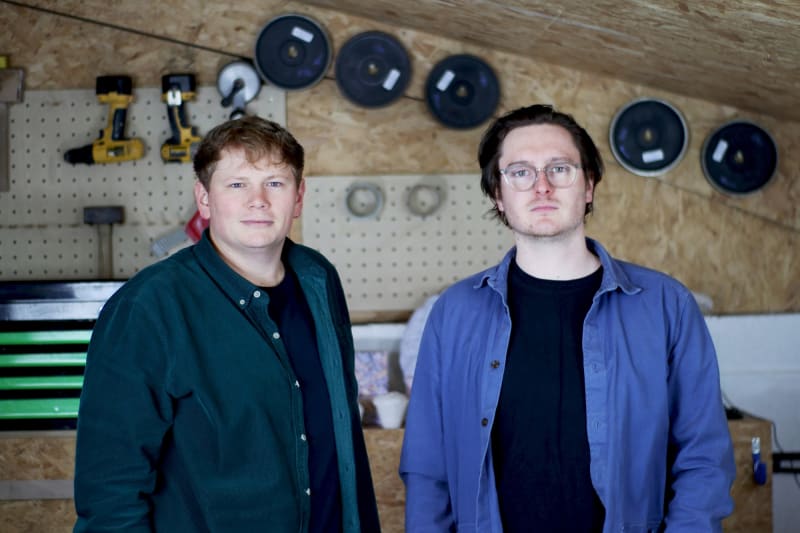Drawing on our respective skills in mold-making and digital tooling, we have developed a process for making multi-part molds for kiln-glass applications. The latest outputs from our collaborative practice have seen us push the complexity, scale, and ambition of this research. We have designed and fabricated fully enclosed modular molds that rely on a glass foam casting method - by adding a reactant, the glass froths and swells to fill the void within. Volumetric calculations allow us to estimate the amount of glass and reactant required, but (unlike traditional glass casting) it is an imprecise science. Under pressure, molds can blow out, rupture, and tear causing the glass to ooze, flow, and stretch at the fractures and seams. We have learned to be receptive to the unlikely and serendipitous outcomes of this experimental and speculative-making practice.
The chosen forms are arbitrary, abstract, and are not inspired by specific stimuli. Instead, the conception and design process is fueled by our desire to push the limitations of the digital tooling and mold-making processes. Complex geometry is digitally designed in acknowledgement of the future steps; the segmentary nature of the 3D printing and, later, plaster molds. This process produces its own unique and un-glass-like aesthetic, with the foamed glass generating an entirely new palette of colours and textures. The works demonstrate the technical possibilities within glass casting; they are deliberate attempts to make objects that challenge the preconception of the glass medium and harness the playful aspect of our collaborative workflow.
Joshua Kerley and Guy Marshall-Brown are glass and ceramics artists based in the South of England. They first met while studying MA ceramics and glass at the Royal College of Art between 2017 and 2019. Kerley and Marshall-Brown’s collaborative practice began in 2022 when they embarked on an Arts Council England funded research project to investigate the potentiality of modular molds for kiln-glass utilising digital tools. The successful outcomes of the research were presented at the Glass Arts Society Conference 2023 in Detroit. The initial research project evolved into an ongoing and natural collaborative practice.
Joshua Kerley is an award-winning artist, designer, and educator specializing in kiln-glass. He completed a BA in contemporary crafts at Falmouth University in 2011, and graduated from the Royal College of Art’s MA ceramics & glass program in 2019. He exhibits regularly at an international level. Recent exhibitions include Heart of Glass at Galerie Handwerk, Munich, and Channelling: Outset Studiomakers Corridor at Frieze London. Since the completion of his MA, Kerley has been awarded the Tiffany & Co. Studiomakers Prize and the Glass Art Society Saxe Emerging Artist Prize. Kerley’s work can be found in the permanent collections of Manchester Metropolitan University's Special Collections Museum, and Lette Glass Museum in Coesfeld, Germany. His work has been featured in publications including Crafts Magazine and Neues Glas. Kerley currently works from a studio in rural Wiltshire and holds the position of senior lecturer (glass) at the University for the Creative Arts Farnham.
Guy Marshall-Brown is a Royal College of Art graduate, having completed an MA in ceramics and glass, and is currently working toward a PhD at the University for the Creative Arts, investigating the analogies between craft – specifically sculptural ceramic practice – and architectural ruin; a practice-led research degree that utilizes extensive ceramic material testing and develops upon the history of ceramic imitation stone. Marshall-Brown’s practice is centered around the ceramic medium but commonly includes digital tools and media. His ceramic sculptures have been exhibited internationally in various craft and art contexts. Recent notable events include Design Miami; Mint Gallery London; Modern Masters with Galerie Handwerk, Munich; and Puls Contemporary Ceramics, Brussels. Originally from Gloucestershire, Marshall-Brown lives and works in North Somerset, UK.
